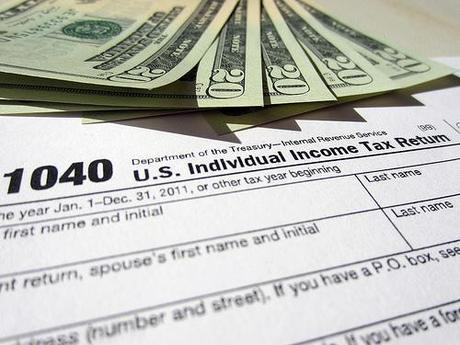This could have been a huge announcement: IRS offers reprieve to expatriate tax filers. In fact, I think it's a very positive step, but there are some issues.

Photo by 401(K) 2012
For those who haven't been following along here's what's going on.
If you move from California to New York, you may have failed to notice something that didn't happen. Specifically, California does not come after you for income taxes for the rest of your life. Why not? Well, why are taxes collected? Taxes are collected to offset the costs the government incurs for providing you services. If you're forced to pay money to a government and receive nothing in return, this is called paying tribute, not paying taxes. In my case, I've lived in Texas, Louisiana, Washington (state), Oregon, Hawaii and Alaska. If all of those states were to chase after me for taxes, I'd go bankrupt just paying for the tax preparation, not to mention the taxes.
I have also lived in Japan, the UK, the Netherlands and now France. Can you imagine if I had to pay taxes to five countries and six US states? This would completely shut down large portions of the world economy as people would be incapable of leaving their home countries and multinational businesses would suffer greatly.
This is why countries tax people resident in their countries. Residents receive the services, expats do not. Except that there are two countries that do tax their expats: the dictatorship of Eritrea and the United States.
Except that even with the USA, there's an interesting problem: we expats were never told of this. In fact, it wasn't until the last issuance of our passports that there was even a mention (in small print at the back) that we were liable for them. Having lived abroad for years, I've been in US consulates several times and I was never told of this legal obligation, nor had I ever seen notices to this effect. Surveys that I've read and numerous news articles reinforce this point: We simply had no idea that, with the exception of the Eritrea, the US is the only nation that taxes their citizens abroad (actually, they try to tax foreign nationals too, but that's another post).
Lately there's been a lot of talk about taxation and many expats are finally learning that they're subject to them. Fortunately, I already knew about this and I file my taxes with Expatriate Tax Returns, but not everyone has been so lucky as to know about the issue.
Please note that I am not a lawyer or accountant, so do not consider any of the following to be legal advice!
That's where the IRS "reprieve" comes in. Basically, if you didn't know about your tax obligations, you can "come clean" if you file your past three years of taxes and past six years of missing FBARs (Foreign Bank Account Reporting). From the IRS publication:
While more details will be forthcoming, taxpayers utilizing the new procedure will be required to file delinquent tax returns, with appropriate related information returns, for the past three years and to file delinquent FBARs for the past six years. All submissions will be reviewed, but, as discussed below, the intensity of review will vary according to the level of compliance risk presented by the submission. For those taxpayers presenting low compliance risk, the review will be expedited and the IRS will not assert penalties or pursue follow-up actions. Submissions that present higher compliance risk are not eligible for the procedure and will be subject to a more thorough review and possibly a full examination, which in some cases may include more than three years, in a manner similar to opting out of the Offshore Voluntary Disclosure Program.
To qualify as low risk, if you owed $1,500 or less for each of the three years, you should be fine. Except ... (emphasis mine):
In general, the risk level will rise as the income and assets of the taxpayer rise, if there are indications of sophisticated tax planning or avoidance, or if there is material economic activity in the United States. Additional risk factors include any additional history of noncompliance with United States tax law and the amount and type of United States source income. Additional information regarding the specific factors the IRS will use to assess the level of compliance risk, and how information regarding those factors should be presented in the submission, will be released prior to the effective date of the new procedure.
Hello! Thank you for being vague. What is "sophisticated tax planning"? And what does "the amount and type of US source income" mean? This procedure goes into effect September 1st, so if you're delinquent on your taxes, you've probably already missed the deadline for this year (unless you have an approved extension), so do not file your taxes before September 1st! (Again, contact a lawyer or tax preparer first! Do not trust my advice).
I think this is a very welcome move by the IRS, but to date they've made it clear that they don't really care that no one was told about the laws they're enforcing, the IRS has reneged on previous promises to fix the situation and they've been terrifying 70 year old grandmothers. If you're going to accept the IRS's offer, be very careful.

